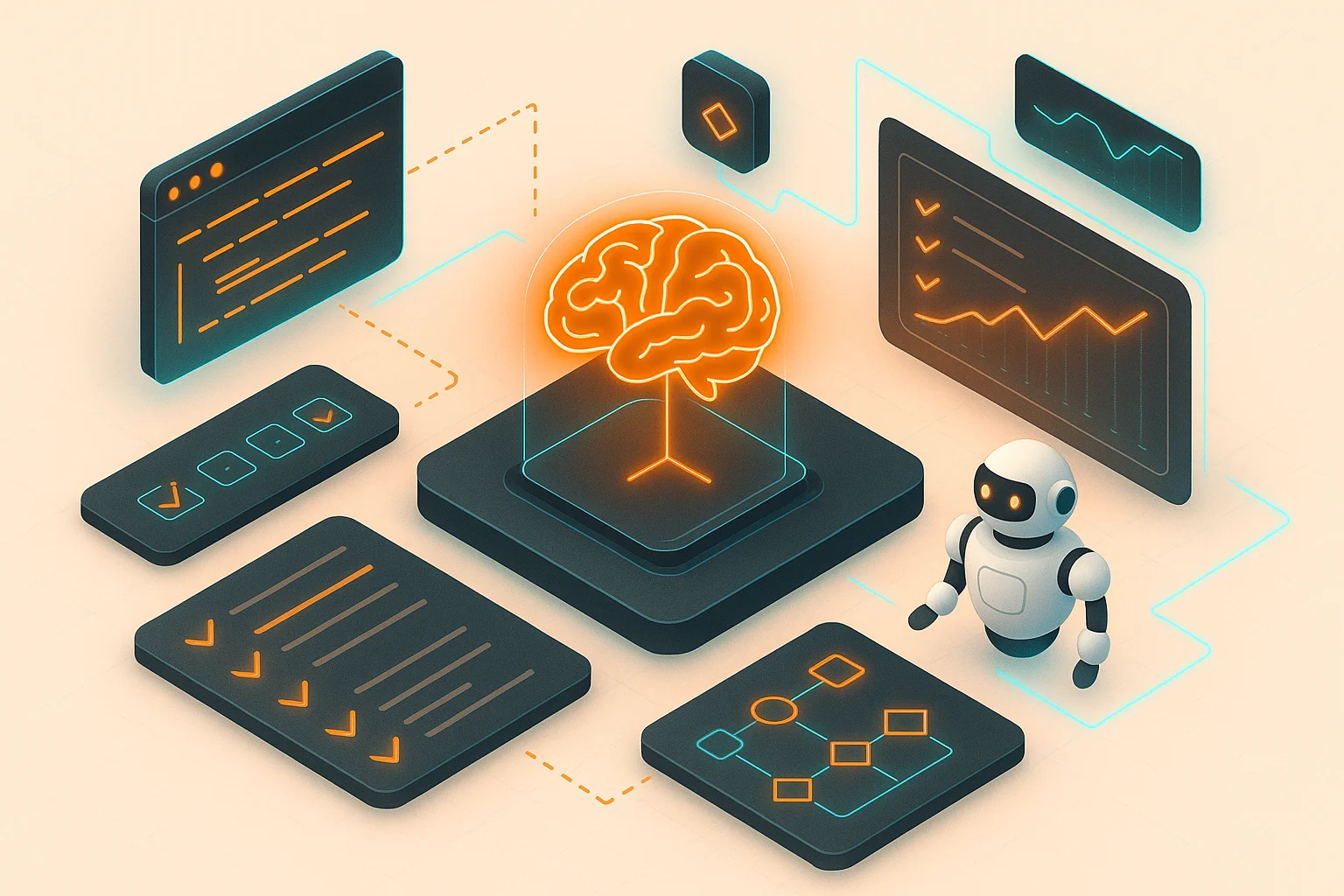AI Software Testing: 5 Tools That Cut Testing Time by 70%

Software testing has always been a field of continuous improvement, evolving from painstaking manual checks to the sophisticated automation suites we use today. We are now witnessing another significant transformation, powered by the advancing capabilities of artificial intelligence. Adopting AI for software testing is not merely about accelerating existing processes; it's about fundamentally enhancing our ability to ensure software quality in an increasingly intricate digital environment. This technology introduces intelligent automation, powerful predictive analytics, and adaptive self-learning systems into the testing domain. This allows teams to achieve broader test coverage, detect defects much earlier in the lifecycle, and extract more profound insights from their testing data, which is crucial for any engineering organization focused on innovation and reliability.
Key Takeaways
- •Target AI for High-Impact Testing Areas: Pinpoint specific bottlenecks in your testing, like time-consuming regression suites or complex bug analysis, to introduce AI. This approach delivers clear, early wins and builds team enthusiasm for broader adoption.
- •Use AI to Amplify Your Team's Strengths: Choose AI tools that handle repetitive tasks and surface critical insights. This empowers your engineers to focus their expertise on strategic test design, maintaining architectural integrity, and shipping better software, faster.
- •Iterate and Improve Your AI Testing Strategy: Treat AI implementation as an ongoing refinement. Regularly assess its impact, gather feedback from your engineers, and adjust your methods to ensure AI continuously enhances your team's ability to deliver quality releases efficiently.
What Exactly is AI in Software Testing?
So, you're hearing a lot about AI in software testing, and you're probably wondering what all the buzz is about. Simply put, AI in software testing means we're using smart algorithms – think artificial intelligence and machine learning – to make our testing processes better. Instead of relying solely on manual checks or basic automation, AI steps in to automate and enhance how we find bugs and ensure our software is top-notch. It's about making testing more efficient, more accurate, and capable of covering more ground than ever before. This isn't just about replacing old methods; it's about augmenting our capabilities to build higher-quality software, faster. For engineering leaders like you, this translates directly to more robust applications and more confident releases, which is always a win.
What Makes Up AI in Testing?
When we talk about what AI actually does in testing, it's pretty cool and surprisingly practical. Imagine AI that can look at your project's requirements documents or even just a plain English description of what a feature should do, and then automatically generate test cases. That's a huge time-saver for your team right there! AI algorithms are also fantastic at sifting through massive amounts of data to spot those tricky edge cases or potential defects that a human tester, no matter how skilled, might occasionally miss. Plus, with Natural Language Processing (NLP), AI tools can understand instructions you write in everyday language, allowing your testers to create test scripts more intuitively and quickly. It's like having a super-smart assistant who understands both your software and how to test it effectively.
How AI Testing Differs from Traditional Methods
You might be thinking, "Okay, but how is this really different from the automation we already do?" That's a fair question! While traditional automation diligently follows predefined scripts, AI introduces a layer of intelligence and adaptability. It significantly speeds up the testing cycle by automating more complex tasks and, importantly, reduces the chances of human error, which means more reliable results for your projects. A big game-changer is AI's ability to learn. It can analyze past test outcomes, identify patterns, and actually improve the accuracy and reliability of future tests over time. This adaptive learning is something traditional methods simply can't offer, allowing us to cover more scenarios with greater confidence and ultimately help your team ship better code.
How Can AI Improve Your Software Testing?
If you're exploring ways AI can genuinely make a difference in your software testing, you're on the right track. It's not just about the latest buzz; AI offers concrete methods to refine your testing processes, making them more robust and efficient. Think of AI as an intelligent partner for your QA team, one that can take on repetitive work, identify patterns humans might not catch, and ultimately help you ship higher-quality software, faster. By integrating AI, you're looking at a future where your testing isn't just a final check, but a proactive, smart component of your development lifecycle. Let's look at some key ways AI is changing software testing, helping teams like yours achieve better outcomes with less friction. This approach is about augmenting human expertise, allowing your talented testers to apply their skills to complex, creative problem-solving where they truly add unique value.
Gaining Better Accuracy and Efficiency
One of the most immediate impacts you'll see with AI in software testing is a significant improvement in both accuracy and efficiency. AI, especially through machine learning, can make testing processes quicker and more precise. It excels at automating those repetitive, time-consuming tasks that are often prone to human error or can lead to tester fatigue. When AI handles these routine checks, it frees up your human testers to concentrate on more intricate scenarios and valuable exploratory testing.
This automation substantially reduces the chances of mistakes slipping through, leading to more dependable test results. Imagine fewer false positives and a much clearer understanding of your software's health. This means your team can spend less time re-running tests or investigating non-issues, and more time on strategic quality assurance activities that truly matter.
Expanding Test Coverage with Predictive Insights
AI doesn't just follow instructions; it can intelligently broaden your test coverage. For instance, AI tools can automatically generate test cases directly from requirements documents or even from user stories written in plain language. This capability alone can save your team a considerable amount of time and effort, especially in the early stages of setting up tests for new features or applications.
Beyond just generating tests, AI algorithms are incredibly effective at analyzing large volumes of data—such as past test results, recent code modifications, and user behavior patterns. From this analysis, they can identify potential edge cases and subtle defects that human testers might easily overlook. This predictive power helps you proactively address issues, ensuring a more thorough and comprehensive testing phase that covers more ground than manual efforts alone could realistically achieve.
Speeding Up Test Execution and Analysis
The demand for speed in software development is constant, and AI can significantly accelerate your testing cycles. By automating many tasks that were previously manual, AI-powered testing tools dramatically cut down the time it takes to run tests and receive feedback. This includes the automation of writing test scripts, which can often be a major bottleneck for development teams trying to move quickly.
Furthermore, AI excels at rapidly analyzing test results. Instead of your team manually sifting through extensive logs and reports, AI can pinpoint failures, identify recurring patterns, and even suggest potential root causes for bugs. This swift analysis means your development team gets actionable insights much faster, allowing them to address issues promptly and keep the development pipeline moving smoothly. This acceleration helps find more bugs earlier in the cycle, which generally reduces the cost and effort needed to fix them.
Frequently Asked Questions
My team already uses test automation. How is AI in testing really any different?
That's a great question, and it's a common one! Think of it this way: traditional automation is fantastic at following explicit instructions you give it, like running through a predefined script. AI takes things a step further by adding a layer of intelligence. It can learn from past data, adapt to changes in your application—like those minor UI tweaks that used to break all your scripts—and even help generate new test cases based on requirements or user stories. So, it's less about just replaying steps and more about intelligently assisting your team to test more comprehensively and efficiently.
We're interested in AI for testing, but we're not a huge enterprise. What's a practical way for a growing team to get started without a massive overhaul?
I completely understand wanting to be practical! The best approach is usually to start small and focused. Instead of trying to implement AI across your entire testing suite at once, pick one or two specific areas where you're feeling the most pain or where you see a clear opportunity for improvement. This could be automating a particularly repetitive set of regression tests or using an AI tool to help expand test coverage for a new feature. This way, your team can learn, see the benefits, and build confidence before you scale up.
Some of my engineers are concerned that AI will make their testing skills less important. How do you see QA roles evolving with AI?
That's a very valid concern, and it's important to address. The way I see it, AI isn't here to replace the critical thinking and expertise of your QA team; it's here to augment their abilities. As AI takes on more of the repetitive, time-consuming tasks, QA professionals can shift their focus to more strategic activities. This includes designing smarter testing strategies that leverage AI, interpreting the complex insights AI tools can provide, and ensuring the overall quality and ethical use of these systems. Their roles become more about orchestrating quality with powerful new assistants.
Beyond just catching bugs faster, what are some of the deeper, strategic benefits AI can bring to our software quality?
While speed is definitely a plus, AI offers much more. It can provide predictive insights, helping you identify high-risk areas in your codebase before major issues surface, which is invaluable for proactive quality assurance. AI can also help achieve broader and deeper test coverage, leading to more robust and resilient applications. By handling more of the routine testing, it frees up your talented engineers to focus on innovation and complex problem-solving, which ultimately contributes to a higher standard of software across the board.
We're a bit wary of AI tools feeling like a "black box." How can we ensure we actually understand and can trust the results they give us?
That's a smart concern to have. Transparency is key. When you're looking at AI tools, ask how they provide insights into their decision-making. Good tools will offer clear reporting and explanations. It's also crucial to remember that AI is a partner, not a replacement for human judgment. Your team's expertise is vital for validating AI-generated results, especially in the early stages. Continuously monitoring the AI's performance and ensuring it's trained on high-quality, relevant data will also build that trust and ensure the outputs are reliable and actionable.
Related internal reading
Ready to Transform Your Code Review Process?
See how Propel's AI-powered code review helps engineering teams ship better code faster with intelligent analysis and actionable feedback.

